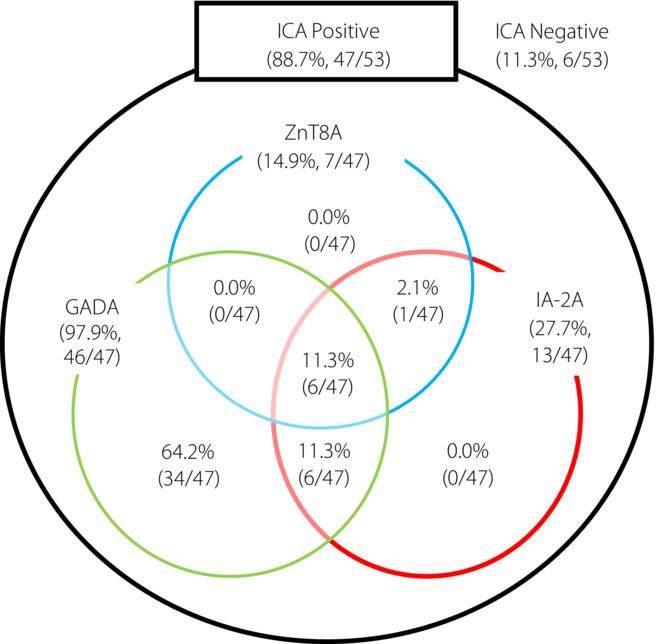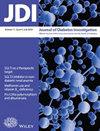Comparison of positive rates between glutamic acid decarboxylase antibodies and ElisaRSR™ 3 Screen ICA™ in recently obtained sera from patients who had been previously diagnosed with slowly progressive type 1 diabetes
Abstract
Aims/Introduction
This study aimed to compare the positivity rates of glutamic acid decarboxylase autoantibodies (GADA) and ElisaRSR™ 3 Screen ICA™ (3 Screen ICA), a newly developed assay for the simultaneous measurement of GADA, insulinoma-associated antigen-2 autoantibodies (IA-2A), and zinc transporter 8 autoantibodies (ZnT8A), in recently obtained sera from patients who had been previously diagnosed with slowly progressive type 1 diabetes (SPIDDM).
Materials and Methods
We enrolled 53 patients with SPIDDM who were positive for GADA at the diagnosis and 98 non-diabetic individuals, and investigated the diagnostic accuracy of the 3 Screen ICA (cutoff index ≥30 units) compared with that of GADA. In addition, we compared the clinical characteristics of patients with SPIDDM who were negative or positive on 3 Screen ICA.
Results
The positivity rates of 3 Screen ICA, GADA, IA-2A, and ZnT8A were 88.7, 86.8, 24.5, and 13.2%, respectively. The respective sensitivity, specificity, and positive and negative predictive values for SPIDDM were 88.7, 100, 100, and 94.2% by 3 Screen ICA and 86.8, 100, 100.0, and 93.3% by GADA. There were no significant differences in age at onset, duration of diabetes, body mass index, glycated hemoglobin and C-peptide levels, and the prevalence of autoimmune thyroiditis between patients with SPIDDM who were positive or negative on 3 Screen ICA. However, the prevalence of insulin users was significantly higher in those who were positive than in those who were negative on 3 Screen ICA.
Conclusions
Similar to GADA, 3 Screen ICA may be a useful diagnostic tool for detecting patients with SPIDDM.


 求助内容:
求助内容: 应助结果提醒方式:
应助结果提醒方式:


